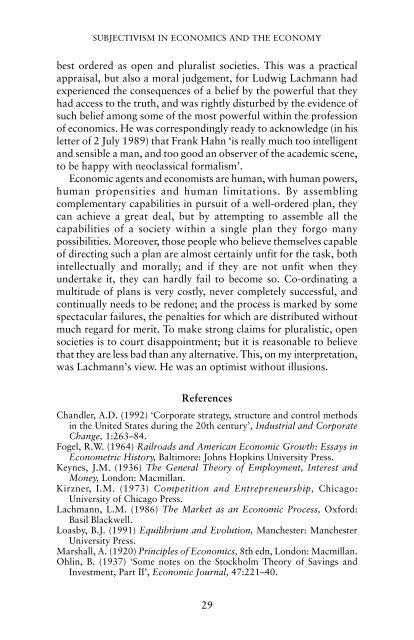Subjectivism and Economic Analysis: Essays in memory of Ludwig ...
Subjectivism and Economic Analysis: Essays in memory of Ludwig ...
Subjectivism and Economic Analysis: Essays in memory of Ludwig ...
Create successful ePaper yourself
Turn your PDF publications into a flip-book with our unique Google optimized e-Paper software.
SUBJECTIVISM IN ECONOMICS AND THE ECONOMYbest ordered as open <strong>and</strong> pluralist societies. This was a practicalappraisal, but also a moral judgement, for <strong>Ludwig</strong> Lachmann hadexperienced the consequences <strong>of</strong> a belief by the powerful that theyhad access to the truth, <strong>and</strong> was rightly disturbed by the evidence <strong>of</strong>such belief among some <strong>of</strong> the most powerful with<strong>in</strong> the pr<strong>of</strong>ession<strong>of</strong> economics. He was correspond<strong>in</strong>gly ready to acknowledge (<strong>in</strong> hisletter <strong>of</strong> 2 July 1989) that Frank Hahn ‘is really much too <strong>in</strong>telligent<strong>and</strong> sensible a man, <strong>and</strong> too good an observer <strong>of</strong> the academic scene,to be happy with neoclassical formalism’.<strong>Economic</strong> agents <strong>and</strong> economists are human, with human powers,human propensities <strong>and</strong> human limitations. By assembl<strong>in</strong>gcomplementary capabilities <strong>in</strong> pursuit <strong>of</strong> a well-ordered plan, theycan achieve a great deal, but by attempt<strong>in</strong>g to assemble all thecapabilities <strong>of</strong> a society with<strong>in</strong> a s<strong>in</strong>gle plan they forgo manypossibilities. Moreover, those people who believe themselves capable<strong>of</strong> direct<strong>in</strong>g such a plan are almost certa<strong>in</strong>ly unfit for the task, both<strong>in</strong>tellectually <strong>and</strong> morally; <strong>and</strong> if they are not unfit when theyundertake it, they can hardly fail to become so. Co-ord<strong>in</strong>at<strong>in</strong>g amultitude <strong>of</strong> plans is very costly, never completely successful, <strong>and</strong>cont<strong>in</strong>ually needs to be redone; <strong>and</strong> the process is marked by somespectacular failures, the penalties for which are distributed withoutmuch regard for merit. To make strong claims for pluralistic, opensocieties is to court disappo<strong>in</strong>tment; but it is reasonable to believethat they are less bad than any alternative. This, on my <strong>in</strong>terpretation,was Lachmann’s view. He was an optimist without illusions.ReferencesCh<strong>and</strong>ler, A.D. (1992) ‘Corporate strategy, structure <strong>and</strong> control methods<strong>in</strong> the United States dur<strong>in</strong>g the 20th century’, Industrial <strong>and</strong> CorporateChange, 1:263–84.Fogel, R.W. (1964) Railroads <strong>and</strong> American <strong>Economic</strong> Growth: <strong>Essays</strong> <strong>in</strong>Econometric History, Baltimore: Johns Hopk<strong>in</strong>s University Press.Keynes, J.M. (1936) The General Theory <strong>of</strong> Employment, Interest <strong>and</strong>Money, London: Macmillan.Kirzner, I.M. (1973) Competition <strong>and</strong> Entrepreneurship, Chicago:University <strong>of</strong> Chicago Press.Lachmann, L.M. (1986) The Market as an <strong>Economic</strong> Process, Oxford:Basil Blackwell.Loasby, B.J. (1991) Equilibrium <strong>and</strong> Evolution, Manchester: ManchesterUniversity Press.Marshall, A. (1920) Pr<strong>in</strong>ciples <strong>of</strong> <strong>Economic</strong>s, 8th edn, London: Macmillan.Ohl<strong>in</strong>, B. (1937) ‘Some notes on the Stockholm Theory <strong>of</strong> Sav<strong>in</strong>gs <strong>and</strong>Investment, Part II’, <strong>Economic</strong> Journal, 47:221–40.29

















